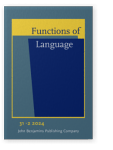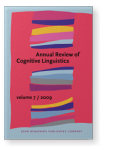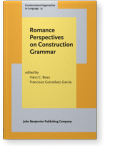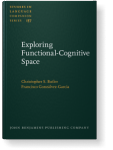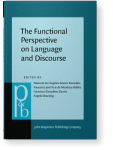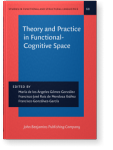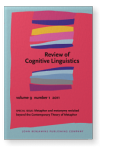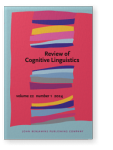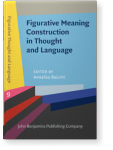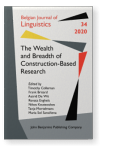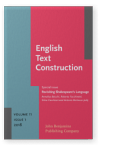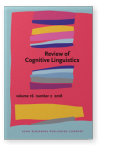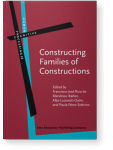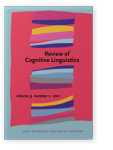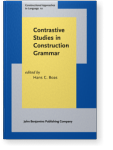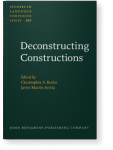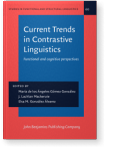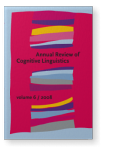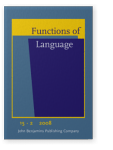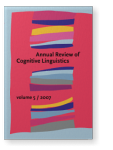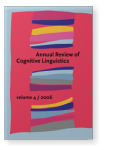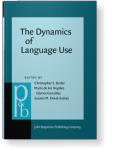Francisco Gonzálvez-García
List of John Benjamins publications for which Francisco Gonzálvez-García plays a role.
Journal
Yearbook
ISSN 1572-0268 | E-ISSN 1572-0276
Romance Perspectives on Construction Grammar
Edited by Hans C. Boas and Francisco Gonzálvez-García
[Constructional Approaches to Language, 15] 2014. x, 316 pp.
Subjects Cognition and language | Romance linguistics | Syntax | Theoretical linguistics
Exploring Functional-Cognitive Space
Christopher S. Butler and Francisco Gonzálvez-García
[Studies in Language Companion Series, 157] 2014. xviii, 579 pp.
Subjects Cognition and language | Functional linguistics | Theoretical linguistics
The Functional Perspective on Language and Discourse: Applications and implications
Edited by María de los Ángeles Gómez González, Francisco José Ruiz de Mendoza Ibáñez, Francisco Gonzálvez-García and Angela Downing
[Pragmatics & Beyond New Series, 247] 2014. viii, 292 pp.
Subjects Discourse studies | Functional linguistics | Pragmatics | Theoretical linguistics
Theory and Practice in Functional-Cognitive Space
Edited by María de los Ángeles Gómez González, Francisco José Ruiz de Mendoza Ibáñez and Francisco Gonzálvez-García
[Studies in Functional and Structural Linguistics, 68] 2014. vi, 327 pp.
Subjects Cognitive linguistics | Functional linguistics | Generative linguistics | Theoretical linguistics
Metaphor and Metonymy revisited beyond the Contemporary Theory of Metaphor: Recent developments and applications
Edited by Francisco Gonzálvez-García, María Sandra Peña-Cervel and Lorena Pérez-Hernández
[Benjamins Current Topics, 56] 2013. vi, 318 pp.
Subjects Cognition and language | Cognitive linguistics | Discourse studies | Pragmatics | Semantics
Metaphor and metonymy revisited beyond the Contemporary Theory of Metaphor: Recent developments and applications
Edited by Francisco Gonzálvez-García, María Sandra Peña-Cervel and Lorena Pérez-Hernández
Special issue of Review of Cognitive Linguistics 9:1 (2011) iv, 339 pp.
Subjects Cognition and language | Cognitive linguistics
2024 Capturing meaningful generalizations at varying degrees of resolution: The case of the family of ser muy de -PP constructions in present-day Spanish Review of Cognitive Linguistics 22:1, pp. 151–203 | Article
This article provides a principled constructionist account (Goldberg & Herbst, 2021) of the main characteristics of expressions like the following: (1) Juan es muy de (ir de) bares (‘Juan is very into (going to) bars’), and (2) Tu ayuda es muy de agradecer (‘Your help is very much appreciated’).… read more
2020 Metonymy meets coercion: The case of the intensification of nouns in attributive and predicative constructions in Spanish Figurative Meaning Construction in Thought and Language, Baicchi, Annalisa (ed.), pp. 151–184 | Chapter
Drawing on Cognitive Construction Grammar (Goldberg, 2006), this chapter furnishes a usage-based analysis of coercion involving the intensification of a prima facie non-gradable category, such as nouns. Our data analysis reveals that, in present-day Spanish, intensifiers (e.g. muy ‘very’,… read more
2020 Maximizing the explanatory power of constructions in Cognitive Construction Grammar(s) The Wealth and Breadth of Construction-Based Research, Colleman, Timothy, Frank Brisard, Astrid De Wit, Renata Enghels, Nikos Koutsoukos, Tanja Mortelmans and María Sol Sansiñena (eds.), pp. 110–121 | Article
This paper suggests two possible ways in which cognitively-oriented constructionist approaches (Cognitive Construction Grammar, Radical Construction Grammar, and Embodied Construction Grammar) could enhance the explanatory power of constructions. First, the anatomy of a construction should spell… read more
2018 Taming iconicity in the Spanish and Italian translations of Shakespeare’s Sonnets : Some observations from a (Contrastive) (Cognitive) Construction Grammar perspective Revisiting Shakespeare's Language, Baicchi, Annalisa, Roberta Facchinetti, Silvia Cacchiani and Antonio Bertacca (eds.), pp. 105–140 | Article
Building on Tabakowska’s (1993, 2003, 2005, 2009, 2013) full-blown defense of a cognitive linguistic approach to literary translation as well as on previous research dealing with the implementations of Construction Grammar(s) for translation studies (Szymańska 2011a, 2011b; Serbina 2015), this… read more
2018 Situating Valency Theory in functional-cognitive space Review of Cognitive Linguistics 16:2, pp. 348–398 | Article
This article builds on the work reported in Butler and Gonzálvez-García (2014), in which 16 functional and/or cognitive/constructionist theories were compared on the basis of questionnaires completed by experts and a reading of the literature on each approach. The aim is to extend this work to… read more
2017 Chapter 5. Exploring inter-constructional relations in the constructicon: A view from Contrastive (Cognitive) Construction Grammar Constructing Families of Constructions: Analytical perspectives and theoretical challenges, Ruiz de Mendoza Ibáñez, Francisco José, Alba Luzondo Oyón and Paula Pérez-Sobrino (eds.), pp. 135–172 | Chapter
Drawing on a cursory contrastive analysis of (i) the reflexive subjective-transitive construction, (ii) the self-descriptive subjective transitive construction, and (iii) the What’s X doing Y? (WXDY) construction in English and Spanish, this chapter explores the feasibility of capturing intra- and… read more
2014 Chapter 1. Applying constructional concepts to Romance languages Romance Perspectives on Construction Grammar, Boas, Hans C. and Francisco Gonzálvez-García (eds.), pp. 1–35 | Article
2014 “That’s so a construction!”: Some reflections on innovative uses of “so” in Present-day English Theory and Practice in Functional-Cognitive Space, Gómez González, María de los Ángeles, Francisco José Ruiz de Mendoza Ibáñez and Francisco Gonzálvez-García (eds.), pp. 271–294 | Article
This paper provides a fine-grained analysis of the “X is so N(P)” constructionin present-day English, in which the noun in the A slot necessarily involvesmetonymic inferencing and can be determinerless, even if it is countable. Thisconstruction conveys a positive or negative assessment by the… read more
2014 Chapter 6. Bringing together fragments and constructions: Evidence from complementation in English and Spanish Romance Perspectives on Construction Grammar, Boas, Hans C. and Francisco Gonzálvez-García (eds.), pp. 181–226 | Article
In this article, I argue that Thompson’s (2002) fragment analysis of (finite) complementation in English, while insightful, cannot be plausibly duplicated for all complementation strategies in English and Spanish. Specifically, this analysis cannot account for a number of semantico-pragmatic… read more
2014 Introduction. Plotting functional-cognitive space Theory and Practice in Functional-Cognitive Space, Gómez González, María de los Ángeles, Francisco José Ruiz de Mendoza Ibáñez and Francisco Gonzálvez-García (eds.), pp. 1–30 | Article
2014 On the relatedness of functionalism and pragmatics The Functional Perspective on Language and Discourse: Applications and implications, Gómez González, María de los Ángeles, Francisco José Ruiz de Mendoza Ibáñez, Francisco Gonzálvez-García and Angela Downing (eds.), pp. 1–16 | Article
2013 Introduction to the Volume Metaphor and Metonymy revisited beyond the Contemporary Theory of Metaphor: Recent developments and applications, Gonzálvez-García, Francisco, María Sandra Peña-Cervel and Lorena Pérez-Hernández (eds.), pp. 1–10 | Article
2011 Review of Leino (2008): Constructional Reorganization Review of Cognitive Linguistics 9:2, pp. 419–428 | Review
2011 Introduction to the Special Thematic Volume Metaphor and metonymy revisited beyond the Contemporary Theory of Metaphor: Recent developments and applications, Gonzálvez-García, Francisco, María Sandra Peña-Cervel and Lorena Pérez-Hernández (eds.), pp. 1–10 | Article
2010 Contrasting constructions in English and Spanish: The influence of semantic, pragmatic, and discourse factors Contrastive Studies in Construction Grammar, Boas, Hans C. (ed.), pp. 43–86 | Article
2009 Measuring out reflexivity in secondary predication in English and Spanish: Evidence from cognition verbs Deconstructing Constructions, Butler, Christopher S. and Javier Martín Arista (eds.), pp. 201–246 | Article
This article provides a usage-based, bottom-up constructionist analysis la Goldberg (2006) of formally identical instances of secondary predication featuring find/encontrar (find) and a reflexive pronoun in the object slot in English and Spanish. Specifically, it shows that these two… read more
2008 Towards a constructionist account of secondary predication with verba dicendi et declarandi in English and Spanish Current Trends in Contrastive Linguistics: Functional and cognitive perspectives, Gómez González, María de los Ángeles, J. Lachlan Mackenzie and Elsa M. González Álvarez (eds.), pp. 281–321 | Article
Drawing on data extracted from the British National Corpus and the Corpus de Referencia del Español Actual in conjunction with elicitation data from native speakers, this chapter constitutes a first step towards a constructionist, usage-based analysis of secondary predication with verba dicendi et… read more
2008 Review of Hannay & Steen (2007): Structural-Functional Studies in English Grammar: In Honour of Lachlan Mackenzie Annual Review of Cognitive Linguistics: Volume 6, Ruiz de Mendoza Ibáñez, Francisco José (ed.), pp. 283–301 | Review
2008 Review of Geeraerts (2006): Cognitive Linguistics: Basic readings Functions of Language 15:2, pp. 304–317 | Review
2008 Cognitive Construction Grammar works: An interview with Adele E. Goldberg Annual Review of Cognitive Linguistics: Volume 6, Ruiz de Mendoza Ibáñez, Francisco José (ed.), pp. 345–360 | Article
2007 ‘Saved by the reflexive’: Evidence from coercion via reflexives in verbless complement clauses in English and Spanish Annual Review of Cognitive Linguistics: Volume 5, Ruiz de Mendoza Ibáñez, Francisco José (ed.), pp. 193–238 | Article
This paper argues for the existence of a dynamic interaction between constructional polysemy and coercion in shaping lower-level configurations of the subjective-transitive construction in English and Spanish. In particular, a fine-grained analysis is provided of those configurations featuring… read more
2006 Mapping functional-cognitive space Annual Review of Cognitive Linguistics: Volume 4, Ruiz de Mendoza Ibáñez, Francisco José (ed.), pp. 39–96 | Article
The aim of this paper is to describe in some detail the topography of the space occupied by functional and cognitive models. We describe the salient characteristics of functionalist, cognitivist and/or constructionist models against the general background of usage-based models, and also include in… read more
2005 On clefting in English and Spanish The Dynamics of Language Use: Functional and contrastive perspectives, Butler, Christopher S., María de los Ángeles Gómez González and Susana M. Doval-Suárez (eds.), pp. 155–196 | Article
